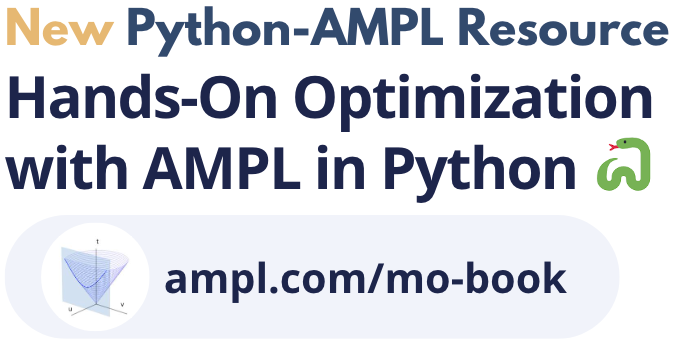VariableInstance#
- class VariableInstance#
The VariableInstance object stores the information regarding a specific instance of a variable.
The instances can be accessed through the function Variable.get of the parent
entity.
value()#
- classmethod VariableInstance.value()#
Syntax
v = value()
Description
v = value() Get the current value of the variable instance
Output Arguments
vThe current value of the variable instance
Example
Create a variable x, get an instance and display its value.
ampl.eval('var x{1..2};');
x = ampl.getVariable('x');
instance = x.get(1);
instance.value
gives:
ans =
0
setValue(v)#
- classmethod VariableInstance.setValue()#
Syntax
setValue(v)
Description
setValue(v) Assigns the specified value to the variable. Equivalent to the AMPL code:
var x;
let x := v;
Input Arguments
vThe value to be assigned
Example
Create a variable x and sets its initial value. Then displays it:
ampl.eval('var x{1..2};');
x = ampl.getVariable('x');
instance = x.get(1);
instance.setValue(4);
instance.value
gives:
ans =
4
dual#
- classmethod VariableInstance.dual()#
Syntax
v = dual
Description
dual Get the current dual value of the variable instance.
Output Arguments
vThe dual value of the instance
Example
Create a variable x, get an instance and display its dual value.
ampl.eval('var x{1..2};');
x = ampl.getVariable('x');
instance = x.get(1);
instance.dual
gives:
ans =
0
lb#
- classmethod VariableInstance.lb()#
Syntax
v = lb
Description
lb Get the current lower bound of the variable. See Note on variables suffixes.
Output Arguments
vThe lower bound of the variable
Example
Create an indexed variable x (using AMPL.eval) and get the value of the lower bound.
ampl.eval('var x{1..3};');
x = ampl.getVariable('x');
instance = x.get(1);
v = instance.lb
gives:
v = 0
ub#
- classmethod VariableInstance.ub()#
Syntax
v = ub
Description
ub Get the current upper bound of the instance. See Note on variables suffixes.
Output Arguments
vThe upper bound of the instance
Example
Create an indexed variable y (AMPL.eval) and get the value of one instance.
ampl.eval('var x{1..3};');
x = ampl.getVariable('x');
instance = x.get(1);
v = instance.lb
gives:
v = 0
fix#
- classmethod VariableInstance.fix()#
Syntax
fix
fix(value)
Description
fix Fix this instance to its current value
fix(value) Fix this instance to the specified value
Example
Create a scalar variable x and an indexed variable y (using AMPL.eval), fix
a few values, solve and unfix them
ampl.eval('var x<=3; var y{1..3}<=4;');
ampl.eval('maximize z: x + sum{i in 1..3} y[i];');
x = ampl.getVariable('x');
y = ampl.getVariable('y');
x.fix(1); % fix variables
y.get(2).fix(2);
ampl.solve; % solve
x.display % display solution
y.display
x.unfix; % unfix variables
y.unfix;
ampl.solve; % solve and display
x.display % display solution
y.display
gives::
ans =
x = 1
ans =
y [*] :=
1 4
2 2
3 4
;
ans =
x = 3
ans =
y [*] :=
1 4
2 4
3 4
;
unfix#
- classmethod VariableInstance.unfix()#
Syntax
unfix
Description
unfix Unfix this instance
Example
Create a scalar variable x and an indexed variable y (using AMPL.eval), fix
a few values, solve and unfix them
ampl.eval('var x<=3; var y{1..3}<=4;');
ampl.eval('maximize z: x + sum{i in 1..3} y[i];');
x = ampl.getVariable('x');
y = ampl.getVariable('y');
x.fix(1); % fix variables
y.get(2).fix(2);
ampl.solve; % solve
x.display % display solution
y.display
x.unfix; % unfix variables
y.unfix;
ampl.solve; % solve and display
x.display % display solution
y.display
gives::
ans =
x = 1
ans =
y [*] :=
1 4
2 2
3 4
;
ans =
x = 3
ans =
y [*] :=
1 4
2 4
3 4
;


